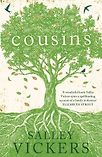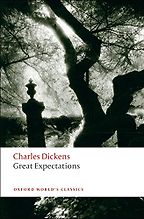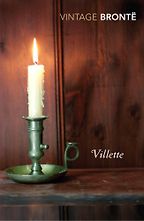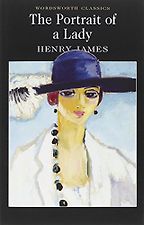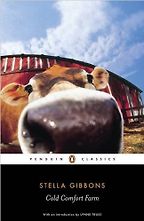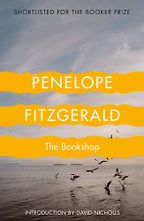These first three novels you’ve chosen—Charles Dickens’s Great Expectations, Charlotte Brontë’s Villette and Henry James’s The Portrait of a Lady—come from a period between the mid- and end of the 19th century, when there was a great deal of advance in the field of psychology. The term ‘psychiatry’ was coined; theories developed in phrenology; Hegel published Phenomenology of Spirit, which describes his dialectical method, according to which knowledge moves towards greater certainty, and ultimately towards knowledge of the noumenal world; Kierkegaard published The Concept of Anxiety; in 1872, Douglas Spalding published his discovery of psychological imprinting; Ivan Pavlov began experimenting on animals. The list is a long one. Can we assume that Dickens, Brontë and James were aware of the leaps that were being made in the field?
They almost certainly were—particularly Henry James whose brother, William James, was an extraordinarily successful psychologist and philosopher, one of the greatest. But it was also kind of in the culture. Without necessarily boning up on it, they were all absorbing it. The cultural backdrop of the time was very much moving towards the development of what became the psychological and psychoanalytic movement. I mean, George Eliot was a great reader of Ludwig Feuerbach, for instance. There was a great deal of consideration of psychological development—it was an existential period, more so that the twentieth century, I think.
You worked as a psychotherapist for some years. Is your own fiction informed by your experience in the field?
People often think that the novels come out of my work as a psychoanalyst/psychotherapist but, really, it’s more the other way round. I originally got into the area of psychology through being a teacher of English literature and I suppose my principal interest in English literature was, or is, the way it explores human relationships and the psychology of individuals in a way that is very difficult to do in actual life. An author can get inside the heart and mind and psyche of a character far more successfully than any human being can get inside those aspects of another living human being. I’m not alone in believing that—Freud always said that he learnt everything from the great writers and the great poets. There is something about literature, or great literature, that will always, or nearly always, provide a psychological slant on human beings and relationships.
And both disciplines are fundamentally concerned with different ways of creating and telling stories.
Working as a psychologist taught me how to explore the different unlived elements of myself. That’s important because, in talking to the people who came to see me, I had to find the corresponding aspect of myself in order to communicate effectively with them. So it wasn’t so much that I drew from my experience of talking to people who had psychological problems, it was more, in a way, that I was able to tease out threads within myself, to assemble elements in myself, that reflected their problems and their particular take on life.
Freud plays a significant role in your novel, Where Three Roads Meet (2007).
He’s an ageing and very ill Freud, in the late 1930s, after he has escaped from Nazi Vienna and come to England, where he is very celebrated. At this stage, he was in the very last stages of a serious cancer of the jaw, and during that period he did occasionally take morphine. So my trope on that was [that] perhaps when he was taking morphine, or perhaps just when he’s alone and not entirely conscious in the normal way, he escapes his rational lines and the mythical figure of Tiresias comes and talks to him and tells him what really went on in the Oedipus story, which Tiresias thinks Freud has misunderstood. So it’s a sort of play with Freud and his Oedipus complex.
Is it fair to say there are faint echoes of that myth in your new novel, Cousins?
Well, that’s rather astute of you because plainly it is about family dynamics but it also concerns a family murder. I didn’t write it in order to make further Freudian observations (perish the thought), but it is true that it is about the return of the repressed, which is a Freudian concept and, unlike his Oedipus theory, I think, a rather true one. In Cousins the buried secrets of three generations of the Tye family come back to haunt them with catastrophic effect.
“We all have a story about ourselves, and with luck psychoanalysis will clarify and purify that in a way that is creative and potentially healing”
But it is also a love story between two people who are kindred spirits but whose family history denies the fulfilment of their love. So it is also perhaps Romeo and Juliet—Shakespeare is one of my touchstones—although, again, in a different key. It is a book into which, for the first time, I have ploughed some of my own family’s history—especially my parents’ wartime history and their membership of the British Communist Party, and was particularly hard to write for that reason. But now I have done it I feel that I grew as a writer with the book, and as with all my books, I learned something. As one of my characters almost says—another classical allusion—’Cry woe, woe, but let the good prevail’. We must all try to do that in these dark and troubling days.
Let’s start with Great Expectations (1861), a bildungsroman that depicts the personal development of an orphan nicknamed Pip. Is it the piece-by-piece growth of the character—the tussle between nature and nurture, and so on—that makes this novel a good fit for your theme, or is there something more sophisticated at work?
I think the most engaging aspect for me is how it works as a psychoanalytic novel. It is written by the mature Pip looking back on his life, so it is, if you like, a kind of extended version of what might happen in a very lengthy and very in-depth, honest psychoanalysis session. So you get this process that you can never have in life except in psychoanalysis. And one of the reasons I’m so interested in psychoanalysis is that it is about story-telling, about clarifying the story about oneself—we all have a story about ourselves, and with luck psychoanalysis will clarify and purify that in a way that is creative and potentially healing.
“Pip comes to see where he has been blind, where his moral values have gone wonky”
But what’s interesting in Great Expectations is the double framework that is set up by the mature Pip writing, but, as he writes, you also have the young naïve, gullible, ignorant Pip emerging as well. So that’s a real technical skill that Dickens pulls off—that double perspective is impossible to have in real life except in psychoanalysis, or perhaps, to a degree, it’s possible in the confessional, too. But it’s a prime example of a good analysis because Pip comes to see where he has been blind, where his moral values have gone wonky.
Ideas about guilt and responsibility jostle for attention, too.
Yes, and I think the great psychological lesson that I learnt from reading the novel is that even if you don’t choose certain aspects of your personal fate, you’re still responsible for them. So Pip meets Magwitch the convict entirely against his own will—he neither wills, wishes nor chooses it; he is encountered by the escaping Magwitch, and the consequences of that haunt and dog Pip for the rest of his life. And what he learns is that you can’t undo that, you have to play the cards you are dealt. That’s one of life’s great lessons. It’s something that, when I was working with people, I would be endeavouring to help them to come to terms with. We may not like the cards we’re dealt, but they are the cards we are dealt: we’re dealt these parents, these conditions, and so on. So, in that sense, Great Expectations is a very successful piece of realistic psychology.
There is a sense in which the whole book is a representation of the individual mind, torn in conflicting directions and understandings, between possible selves. Dickens appreciates how each person struggles between different selves, one actual, one ideal and another feared. What role does the reader’s own psychology play in all this?
None of these novels work unless you are drawn into them. You have to be galled into imagining that you are the young Pip and that you’re seeing his mistakes at the same time as being him as he commits them. You get caught up in his desire that his fortune has come from Miss Havisham but, of course, it hasn’t, and you feel for him and really want it to be true, too. As a naïve reader you’re taken along with it, you don’t know where the money has come from either, I mean you might guess that it’s not from Miss Havisham, but he puts in plenty of signs that it has, and she herself colludes in that. When that revelation comes, that moment of discovery that Pip has been duped and has duped himself, it definitely makes a demand on the reader: you have to forgo your own expectations and hopes for him.
The next novel, published about a decade before Great Expectations, is Charlotte Brontë’s Villette (1853), the story of a young woman, Lucy Snowe, who, a bit like Pip, has no known living relatives, and travels from her native England to the fictional French-speaking city of Villette, in Belgium, to teach at a girls’ school. It seems, especially in this Brontë anniversary year, that a growing number of writers and academics are following in the footsteps of George Eliot and citing this as Charlotte’s best—that is, better than Jane Eyre. Are you in that camp?
I don’t want to decry Jane Eyre—this isn’t an anti-Jane Eyre stance!—but I think that it’s a fairy story. Not that I’m averse to fairy stories. I’ve just contributed to a new volume of stories called Reader, I Married Him, all based on that iconic final line. I, personally, have never liked that line, I think there’s something smug and self-satisfied about it. I also think—and this is me psychoanalysing Charlotte Brontë—that there was something in Charlotte Brontë that needed to cut Rochester down to size and put Jane finally in control over him, and I suspect that that is something to do with her own dented romantic adventures, the areas in which she herself experienced rejection and the areas in which she herself experienced feeling sexually unattractive. And so it’s a moment when I feel the author’s ego superimposes itself on the organic evolution of the book.
“There was something in Brontë that needed to cut Rochester down to size, and I suspect that that was to do with her own dented romantic adventures”
In Villette, though, she’s become a much more mature writer. Brontë does not try to make Lucy Snowe attractive. In Jane Eyre, the protagonist is supposed to be small and plain but you know you’re really supposed to find her appealing, as Rochester does. Brontë doesn’t do that with Lucy. She leaves her as she is—she remains plain and emotionally repressed. She’s very angry. And Brontë sustains this courageously, right up until the end when she may or may not get her heart’s desire. There’s a sort of withholding of the personality of Lucy Snowe; she does nothing at all to seduce the reader. Brontë is very brave in this: she is not prepared to make Lucy Snowe attractive to the other characters or to the reader.
But Lucy Snowe is keen to experiment with different versions of herself in the course of the novel, isn’t she?
Yes, she tries out different selves. She dresses as a man when she’s obliged to play the part in a school play; and then she dresses in a very feminine pink gown when she goes to the theatre with Dr John and his mother. There’s something about her trying out these alternative selves that, again, I think is very interesting and quite radical.
The psychological demands made of the reader are, arguably, greater here than they are in Great Expectations, and certainly in Jane Eyre. If anything just because of the ending.
Yes, and there’s the most brilliant description of a nervous breakdown at the very centre of the book, too, when she’s left virtually alone by Mme. Beck in the school while everyone is on vacation. It’s an extraordinary piece of writing. There’s a fragmented quality to the prose, so that you yourself, as a reader, find an incoherence as you read it, and identify with it. It’s very, very painful and I’m sure that’s why Villette has not been so popular. Although Jane Eyre looks a little painful, you sort of know she’s going to get a happy ending. Brontë doesn’t give Lucy a happy ending. We don’t know if Monsieur Paul is going to come back to her at the end.
Brontë described the ending as a ‘little puzzle’; it seems the antithesis of the ‘Reader, I married him’ line.
It’s much more persuasive. She’s had the courage to live with the kind of psychology that she best knows, which is her own psychology, but which she has managed to objectify brilliantly in Lucy Snowe. She’s choosing not to ply herself with the kind of consolations that an author can.
It’s a novel famous for its plot twists and, in particular, for one in which the narrator willfully keeps important information from us. What effect does it have on the reader?
I like to think that she’s, in a way, doing something very modern which is giving to the reader the kind of experience that Lucy Snowe is experiencing. We are not allowed to have any secure sense of what is actually going on and what is going on around her. So it evokes in us the same kind of insecurities that Lucy is herself undergoing. That’s a very modern technique—you don’t get that in George Eliot, who is a supreme psychologist. I think Villette is Charlotte’s Wuthering Heights. There’s the same kind of upset to the readers’ comfort, and this brilliant sense of we think it’s one thing and it turns out to be another.
And religion comes crashing in to further complicate matters, Monsieur Paul being a Catholic who tries to convert the staunchly Protestant Lucy. Not to mention the strange almost digressive strand featuring the nun.
That’s one of the areas where the book does become a little heavy-handed; I’m not a great fan of the Protestant-Catholic element of the book. Part of the effect of the book is down to its multifacetedness, though, and there are bits that she could probably have done with an eagle-eyed editor plucking out. And yet it’s a bit like 1984 which has this incredibly boring bit in the middle but if you took it out it wouldn’t be quite so effective and it’s really hard to say why. With modern editing there’s a tendency to pander to the reader and streamline and I know why that is—they have to sell the books and get them into the supermarkets and so on—but sometimes I think it would be interesting to leave those lumpy bits in.
“With modern editing there’s a tendency to pander to the reader”
The nun, the fact that there is a haunting, definitely acts as a kind of co-relative to Lucy Snowe’s fragmented state of mind and delirium, but it also links in with this bee in Charlotte’s bonnet about Catholicism and Protestantism. I don’t know that it would have been a better book without it. I suppose I do quite like the lumpiness of it.
We get another study in female psychology in Henry James’s The Portrait of a Lady (1881), although his protagonist, Isabel Archer, is much more spirited than Lucy. And while Lucy is the one passively pining for love that doesn’t find her, Isabel is, at least, at the beginning, actively turning proposals down, so intent is she, it seems, on her personal freedom.
Henry James, asked why he gave his characters money, said ‘I gave them money because I want to give them as much freedom as possible.’ Now, if you remember, at the very beginning of the novel Isabel Archer doesn’t have any money, she is left the money by her uncle. And that gives her a kind of freedom she didn’t previously have. But the lesson here is that however much freedom you think you have, you haven’t really got it if your instincts are not free.
Her fortune shackles her in a different way.
I think so. Empowered by money she wants to exert her power. She wants to exert her power in what looks like a benign way, by marrying Osmond and giving him a kind of freedom he doesn’t have because he is poor. She married him for all the wrong reasons. It’s a very good example of when people act from a sense of forced principle. She’s got a picture of herself; the novel is called The Portrait of a Lady and I’ve always been very interested in that because I’m fascinated by people’s pictures of themselves. We all have pictures of ourselves and they usually do more harm than good. The picture Isabel has of herself is that she’s a lady of largesse and generosity, and to some extent that’s true, but it’s only any good being a person of largesse and generosity if you know where to put that largesse and generosity. She’s blinded by her own picture of herself as a grand patron and is unable to see who the characters around her actually are and how they’re using her. She’s dazzled by her own sense of herself as someone who can do good.
In that sense, it’s very much about power—having the power to define yourself and other people.
Henry James is brilliant on power relationships—people say his books are about money and class but they’re not, they’re about power. He understood the ways in which we are all seduced by power. And here we have Isabel who believes she has a desire for freedom but whose stronger desire is, in fact, for power, the power to exert her own freedom over other people. And that is why she makes her terrible choice at the end of the book—which I find incredibly painful—when she goes back to her unhappy marriage. There’s a kind of recognition woven into the book’s final pages, a kind of penance, if you like, where again, like Pip, Isabel comes to terms with the limitations of her own picture of herself.
It’s been described as an existential novel, a portrait of consciousness and motivation, critics citing, in particular, a passage about two thirds of the way through, where Isabel meditates deep into the night about her marriage and what to do about it. A line comes to mind—’There is no cure for being alive’—from your own novel, The Other Side of You, in which we meet Elizabeth Cruikshank, a woman reminiscent of Isabel, who has lost her faith in life and love after making a drastically wrong decision. Is suffering a developmental step you can’t skip?
In a sense that line came out of my very great admiration for Henry James. His interest was in consciousness and, in his view, the purpose of being alive was to develop in consciousness, to take in more and more in a bid to perceive the world as it is, more fully, more truthfully, more honestly, and to relate to it more truthfully and more honestly. And that is inevitably a painful business because it involves elements of self-recognition which are very hard to bear. But on his terms life would be insufferable without that development. As I recall that passage, James uses images of constriction, of going into caves and narrowings. So what looked to Isabel like an opening out of life has proved to be a kind of dead end.
It’s the kind of thing you might expect to read in Freud’s The Interpretation of Dreams, which came out almost twenty years after The Portrait. The extent to which Freud came to dominate the field is most apparent in the next novel, Stella Gibbons’s Cold Comfort Farm, published in 1932.
Unquestionably. That’s why I chose it. It’s very funny and very good and it is, without a doubt, taking the piss.
Everyone on the farm that our protagonist, Flora, a 19-year-old-Londoner, moves to (again, after the death of her parents) seems to be suffering some kind of stunted development or psychological imbalance. The farm’s a mess, as a result.
Oh yes, it’s all there: hysteria, paranoia, obsessive-compulsive disorder, sexual repression and its opposite—I’m not sure quite what we should call that nowadays. And it’s very, very funny—it’s a kind of pastiche. There’s a bit, which I can quote by heart because I’ve always found it hilarious, when the character called Mr Meyerburg, or ‘Mr Mybug’, a would-be writer who is after Flora, says: ‘I’m a strange, wild, moody sort of a brute but there’s something there if you care to dig’. And the next line is simply: ‘Flora did not care to dig.’ That, in a way, sums up Stella Gibbons, who, on the one hand, gives you a wickedly funny pastiche of all the possible psychological complaints people might be suffering from at the time, plus a kind of brusque refusal to become involved in it on the part of Flora.
Flora is a pretty balanced individual, isn’t she? She seems quite different to Lucy Snowe and Isabel Archer.
Well, the point about Flora is she’s the representative of common sense and the rational mind; all members of the family on the farm are representations of the unruly aspects of the unconscious. You could, if you wanted, say that Flora is the rational ego and the rest of them are the id, and the something nasty in the woodshed is a parodic version of Freud’s unconscious.
But the remedy here is not deep analysis; the remedy is brisk common sense and rational adjustments. Gibbons is also parodying the development of a kind of self-involvement which I think has continued to develop in our own society, a sort of over-interest in one’s own position and personality. So her novel is a social comment as well—you could say it’s a political novel, too, in that it’s debunking the trend towards over-individualism.
The Bookshop (1978) by Penelope Fitzgerald is your final choice; it’s a novel in which one individual, Florence Green, is in fact utterly crushed.
In general, Fitzgerald’s study of the human psyche is quite outstanding. Her people are so real. And what she’s truly brilliant at is the depiction of everyday failure; she’s absolutely anti-heroic in every sense of the word.
She’s been described as having a special sympathy for those who were, in her own phrase, ‘born to be defeated’.
Yes, and she has a very fine sense of what she calls ‘the tribes of torturers’—there’s a passage in one of her books where she says of a terrible woman, ‘She belonged to the tribe of torturers; why pretend they don’t exist?’
What does The Bookshop add to our study of psychology?
The reason I chose the novel—because it’s not my favourite: my favourite is probably The Gate of Angels, or The Beginning of Spring—is because of Brexit. It gives us a picture of the mean-spiritedness and the small-mindedness of certain communities which perceive in people who are other or strange a target on which to place their own dissatisfaction. And that is what happens to Florence Green, a middle-aged widow, who decides to open a bookshop in this little East Anglian community, and is defeated by the sadism and malice of one of the principal characters there who contrives to spread ill will among the rest of the community.
“I’m not only interested in the psychology of the individual, I’m interested in the psychology of society”
I think that happened over Brexit. So I’m not only interested in the psychology of the individual, I’m interested in the psychology of the society: the ways in which society can pick up a mood which does not stand up to any kind of rational analysis. All this woman is trying to do is to run a bookshop in the village. She runs up against another woman, Mrs Gamart, who dabbles with the idea of running the shop as an arts centre—although she’s never done anything about it until now and didn’t really seem interested until Florence moved in.
Mrs Gamart is much more powerful than Florence; she has ‘contacts,’ among them ‘parliamentary contacts’, and much more money—she lives in the ‘big house’—and by stealth and by spreading rumour and gossip and implying that when the other shopkeepers’ businesses are deteriorating it is somehow the fault of the bookshop, even though you could not possibly make any rational connection between the two things, she turns the whole community against Florence. This woman engineers a feeling of hostility so strong that Florence is driven out.
It’s a study in the herd mentality that sees humans group together to turn on the wounded and vulnerable—or simply the different—among us. Florence is an outsider and a widow.
Yes, and they call her Mrs Green—that’s one of the ways in which they alienate her. And Mrs Gamart’s campaign is supported not just by her money and influence but also by the law [she finally brings a case against Florence for stocking Lolita]. Fitzgerald is a great novelist on ordinary people and the courage of ordinary people but also on the ways that the powerful can exert their collective influence in ways that can do such harm. And that’s how I relate it to the psychology of Brexit: people were told lies which fed into their own feelings of dissatisfaction. There’s nothing like our own feelings of dissatisfaction for making us seek targets to account for it that are outside ourselves—Carl Jung had a great term for it, he called it the ’shadow’. Although this woman has done nothing to any of the other people in the community, because they themselves are suffering, it’s very easy, because she’s a bit strange and doing something unusual, to make her, like the foreigners in our midst, the source of their own dissatisfactions.
Get the weekly Five Books newsletter
Much of it seems to come down to simple failures of communication, the absence of an honest dialogue between characters. AN Wilson has described her as ‘the mistress of what was left unsaid’ and her fictions as ‘stories of unspoken, misunderstood, unrequited love, of unsatisfactory marriages which are never—as they might be in a modern therapy session—talked through, of ironies which depend for their effect on semi-silences.’
She’s also got a sense of the mystical and of another dimension. Just before she died, she wrote very beautifully about my novel Miss Garnet’s Angel—she described it as ‘strange, unexpected and haunting.’ She has a real sense of the intangible. And sometimes the intangible is a public mood, as it is in The Bookshop, but sometimes it’s something more mysterious that erupts or invades everyday life bringing a different dimension.
Five Books aims to keep its book recommendations and interviews up to date. If you are the interviewee and would like to update your choice of books (or even just what you say about them) please email us at [email protected]
Five Books interviews are expensive to produce. If you've enjoyed this interview, please support us by donating a small amount.

